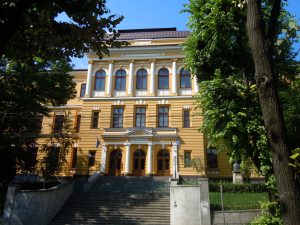
The CFR (the Romanian Railways) employees cancelled the strike a couple of hours after it had started, though they didn’t get a thing in exchange. It’s true, out of a legal decision that was declaring the strike illegal. Even though they were assured that they would receive the third salary and the salary rights left undelivered from 1998, teachers decided to carry on the strike. The reason: promised money that never reached the school accounts, even if nobody confirmed that, but they are said to be delivered by the Finance Ministry. In fact, as everybody knows, this counter process can last even ten days.
Of course, the teachers’ two requests were not their only ones. The most important one was that of the reference salary doubling, a request that could lead to the teachers’ salaries doubling, if Government approves that. There’s probably much to negotiate, here. The Government promised teachers a wage increase of 50% for certain. With good reason, they can hardly put up with the most ordinary spending related to subsistence.
It’s interesting to see how the union leaders place their positions. They ask for something and that’s it. By no means, the Government itself is to be blamed as it never asked the union leaders to give any solutions for salary increase financing with some exceptions, as the most of the democratic countries do. The European or American union offices have real armies of economists affiliated. When they come with a salary type of request, they also bring the necessary documentation clearly indicating the sources at the same time. In our case, only the "Solidaritatea" union of the engine drivers tried to do so, mostly under the public opinion pressure, at the end of the last year.
Mugur Isarescu has recently declared that in Romania, teachers happen to have the smallest amount of hours in Europe: 18 hours a week, in comparison with the average one of 24. In Germany, the teaching work quota amounts to 25h/day, meaning with almost 40% bigger than that of a Romanian teacher. Needless to say that, a German teacher earns much more, his salary being converted in Euro. Nevertheless, talking in percentages, in Germany, it is not more than the average salary per country, corresponding to the previous percentage.
Of course, nobody can say that teachers’ salaries in Romania are under the limit of a minimum dignity. How can anybody ask probationary teachers to do their duty in a school where even the dust woman has almost the same salary, even if she had studied only four years? A situation as much absurd as humiliating.
What can be done when the budget is so small? Moreover, IMF didn’t accept a budget bigger than the third percentages from PIB (the Internal Gross Product) at the negotiations of these weeks. Under these circumstances, no expense can be possible without compensation in production.
During economic recession, the most harmful investments are those on a long term, the external businessmen and financiers would say. True, but it is the economists who reached the conclusion that these investments are the most socially successful ones. Japan was reborn after the war making huge investments in education and research. How was it possible? Obviously, they were asked to tighten their belt. This wasn’t referred to education, nevertheless. Using the loans made on the external markets, extremely expensive after the war, Japan didn’t finance the enterprises sentenced to death or activities that can’t prove that they will any extra profit. It encouraged the small business and didn’t kick at offering money, at the same time with parallel adjustment programs, high technologies fields at that time and education, as well. All of these made on the basis of a reforming program to increase performances. A good organization and the presence of some governmental plans extremely concrete, on middle and long term, made the outcomes to come into light in only a matter of few years.
The comparison may be a little bit exaggerated. In Japan, during 37 years, namely in the postwar crisis and up to 1992, a single party was on power, fortunately a liberal one. And these is due to some concrete plans that were stipulating that every penny got by a huge effort by the government, has to be well saved, so that they shouldn’t be spent unprofitably, but bring about a profit. But who is entitled to say that a plan elaborated on a middle term by the Romanian government and EU, who offered to do this by herself, will not prove efficient? Japan did it under extremely harsh circumstances. We are not able to succeed under the most favorable ones.
The government has its own fault, we had already said that many times before. But nor the unions shouldn’t be completely absolved.
For many years the Romanian experts have got used to ask for a bigger slice of bread from the budget. But what do they offer in exchange? The gun to the Government’s head, namely, the threat that they will freeze the school year, they’ll block the railways, etc. Thus, the Romanian trade unionists seem to be far away from entering Europe, where any request is accompanied by a financing plan, carefully elaborated by the union office economists. But, in a country where the strikes are going on without an end, to raise this issue can seem funny to us. It doesn’t matter how much justifiable the trade unionists’ requests are, but just the fact that there is still a strike going on. (Claudiu RAUS)























